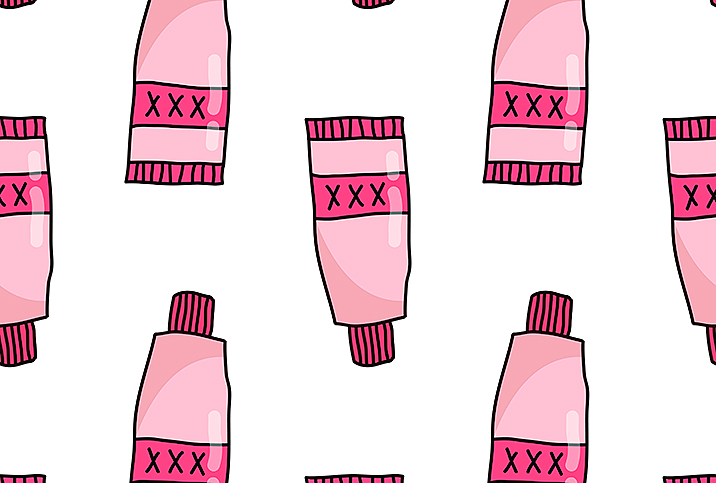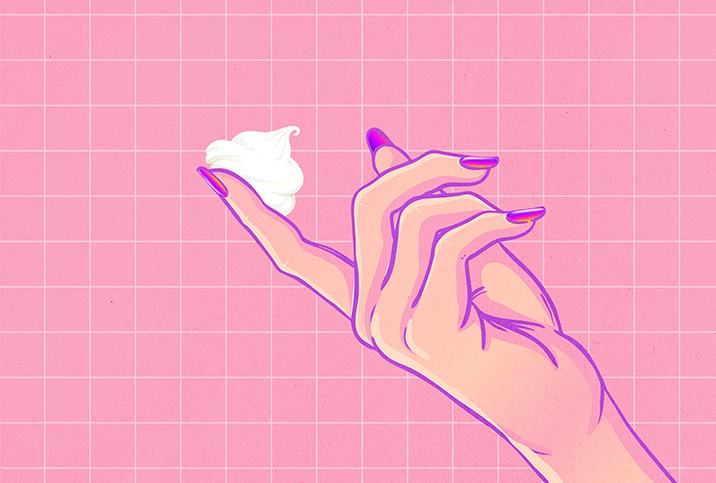Why Are There So Many Types of Lube?

It can be a little daunting to peruse the shelves of the family planning section, virtually or in person, in part because of the robust selection of lubricants on the market. From water-based to oil, lube can enhance your pleasure. It isn't just for those with dryness—it's a way to make sure your sex life is at its optimal peak.
"Lube is an absolute necessity in anyone's toy chest or bedside cabinet," agreed David Brassett, a sex toy reviewer from The Big Gay Review. "It's like that cold scoop of ice cream on top of a warm apple pie. Sure, the pie tastes great without the ice cream…but when you add it? Oh my god."
But don't just run out and grab the first lube you see. Some of the cheaper options are potentially dangerous for your body, especially when they'll be making contact with a vagina. A healthy vagina should maintain a pH level of 3.5 to 4.5, so the lube you use should also be around the same level. The more ingredients a lube has or hard-to-pronounce chemical components, the greater the potential for it to cause irritation. Avoid ingredients such as parabens, chlorhexidine gluconate, petroleum and so-called "antimicrobials."
So, what kind of lube should you be shopping for?
Lube types and their uses
Water-based lube
This type of lube is typically thought of as an all-purpose lube because it's generally safe to use with any toys or condoms. It's popular for a variety of reasons: It doesn't stain your sheets, it's easy on the skin and it washes off with (and in) water.
"A good water-based lube is wonderful for solo masturbation or playing with strokers and sleeves. It's much easier to clean up, and water-based lubes are widely available from most drugstores," Brassett said.
The downside is its quick drying time, but that can be remedied by adding a few drops of water or just adding more lubricant. Although they can be used when engaging in anal play, they may not be the best for the job.
Silicone-based lube
If you're looking for a long-lasting, silky glide, silicone-based lubes are perfect for you. Silicone-based lube is an excellent choice for anal sex, and any kind of fun you get into in the shower, tub or other splash zone, as it lasts for ages and holds up in water. It's also good for sensitive skin and is safe to use with condoms. Unfortunately, it cannot be used with any silicone toys, as it will damage the toy, and it can stain your sheets.
Oil-based lube
"Oil-based lubes are perfect for a standard stroke session," Brasset said. "The oils soothe and nourish the skin, as well (leaving you feeling nice and hydrated afterward—always a bonus), but they are not recommended for use with toys or with any contraceptive barriers. They make great massage oils, as well."
Similar to silicone-based lube, oil-based lube lasts for a long time, so there's typically no need to reapply, making it a great choice for long sessions. Some oil-based lubes come with additives such as CBD to make things even more pleasurable or less painful for those with chronic pain or conditions, such as vaginismus. But all good things have at least one downside, and oil-based lubricant is no different. You'll want to be sure to put down a blanket or towel, as it's going to stain your sheets, and it is not compatible with latex condoms. It can also be difficult to clean up.
Hybrid lubes
Mostly water-based, hybrid lubes include a small amount of silicone, varying from brand to brand. Unlike traditional silicone-based lubes, you can use a hybrid lube with your silicone toys. These are also known as "silk lubes." Unlike water-based lubes, they tend to stick around thanks to the addition of the silicone, but also wash off easily like their water-based counterparts.
Natural lube
We're not talking about the type a healthy, excited vagina makes, but instead the stuff made from all-natural products, such as aloe vera or coconut oil. If you're choosing coconut oil, be sure you're using it solely for the bedroom—you don't want to risk cross contamination. And even so, it's best to go with products manufactured specifically for use in the bedroom that have met certain standards so you know what you're getting. Remember, any oil-based lubricant will not be compatible with latex condoms.
When should I use lube?
Using lube is a personal choice and not something we should ever feel ashamed about. If you're in the mood to masturbate, but your body just hasn't gotten the signal yet, then it's time to break out the lube. There's never a time when lube isn't OK to use. It's a matter of using the right type for the situation. Once you've made that call, use as little or as much as you please.
Certain sex acts, such as those involving the rectum, always require lube. Anuses don't naturally lubricate, so to avoid tears and pain, lube is a must. While it's your choice which type of lube you use, silicone-based lubricant works best, as it's thicker and doesn't need to be reapplied as often. However, if water-based or a hybrid lube is what you have on hand, you can make it work—just be sure to reapply as often as needed and don't be afraid to use a lot.
Remember, Brassett said, "Lube most definitely has an expiration." It should also be stored safely away from direct sunlight and securely closed. Look out for changes in consistency, color or smell—any of those are an indication it's time for a new bottle.
So, why are there so many lubes? Well, there's a lot of different kinds of sex. Every job needs the right tool—even those jobs between the sheets.


















